 W
WSyndicalism is a current in the labor movement to establish local, worker-based organizations and advance the demands and rights of workers through strikes. Most active in the early 20th century, syndicalism was predominant in the revolutionary left in the decade which preceded the outbreak of World War I because orthodox Marxism was mostly reformist at that time, according to the Marxist historian Eric Hobsbawm.
 W
W104 Company of Syndicalists was a military unit created by the Union of Polish Syndicalists, which participated in the Warsaw Uprising.
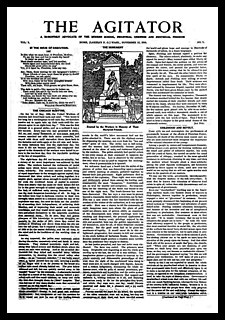 W
WThe Agitator was a radical newspaper published by Jay Fox of the anarchist Home Colony in the American state of Washington from 1910 to 1912.
The Argentine Regional Workers' Federation, founded in 1901, was Argentina's first national labor confederation. It split into two wings in 1915, the larger of which merged into the Argentine Syndicates' Union (USA) in 1922, while the smaller slowly disappeared in the 1930s.
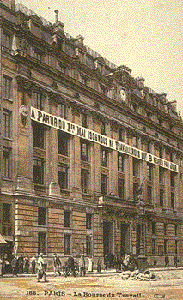 W
WThe Bourse du Travail, a French form of the labour council, were working class organizations that encouraged mutual aid, education, and self-organization amongst their members in the late nineteenth and early twentieth centuries.
 W
WBulletin international du mouvement syndicaliste was a syndicalist periodical published from 1907 by Christiaan Cornelissen and from 1913 by the International Syndicalist Bureau in Amsterdam.
 W
WThe California Criminal Syndicalism Act was a law of California in 1919 under Governor William Stephens criminalizing syndicalism. It was enacted on April 30, 1919, and repealed in 1991.
 W
WThe Confederación Nacional del Trabajo is a Spanish confederation of anarcho-syndicalist labour unions, which was long affiliated with the International Workers' Association (AIT). When working with the latter group it was also known as CNT-AIT. Historically, the CNT has also been affiliated with the Federación Anarquista Ibérica ; thus, it has also been referred to as the CNT-FAI. Throughout its history, it has played a major role in the Spanish labor movement.
 W
WThe CNT-F or National Confederation of Labour is a French anarcho-syndicalist union.
 W
WDe Leonism is a libertarian Marxist current developed by the American activist Daniel De Leon. De Leon was an early leader of the first American socialist political party, the Socialist Labor Party of America (SLP). De Leon introduced the concept of Socialist Industrial Unionism.
 W
WThe Direkte Aktion is a German bimonthly newspaper by the anarcho-syndicalist Free Workers' Union. It has existed since the union's formation in 1977.
 W
W"Don't mourn, organize!" is an expression, abridged from a statement by labor activist and songwriter Joe Hill near the time of his death. Hill wrote the full statement in a telegram he sent to Bill Haywood, which stated, "Goodbye, Bill, I die like a true blue rebel. Don't waste any time mourning. Organize!" Hill followed that telegram with another: "Could you arrange to have my body hauled to the state line to be buried? I don't want to be found dead in Utah." In 1915, Hill was convicted and executed for the murder of John and Arling Morrison a year prior; he denied having committed the murders but, for reasons that remain a source of speculation, was unwilling to give an alibi during his trial.
 W
WThe Farabundo Martí National Liberation Front is one of the two major political parties in El Salvador.
 W
WThe Fasci Siciliani [ˈfaʃʃi sitʃiˈljani], short for Fasci Siciliani dei Lavoratori, were a popular movement of democratic and socialist inspiration, which arose in Sicily in the years between 1889 and 1894. The Fasci gained the support of the poorest and most exploited classes of the island by channeling their frustration and discontent into a coherent programme based on the establishment of new rights. Consisting of a jumble of traditionalist sentiment, religiosity, and socialist consciousness, the movement reached its apex in the summer of 1893, when new conditions were presented to the landowners and mine owners of Sicily concerning the renewal of sharecropping and rental contracts.
 W
WThe Iberian Anarchist Federation is a Spanish organization of anarchist militants active within affinity groups in the Confederación Nacional del Trabajo (CNT) anarcho-syndicalist union. It is often abbreviated as CNT-FAI because of the close relationship between the two organizations. The FAI publishes the periodical Tierra y Libertad.
 W
WThe First International Syndicalist Congress was a meeting of European and Latin American syndicalist organizations at Holborn Town Hall in London from September 27 to October 2, 1913. Upon a proposal by the Dutch National Labor Secretariat (NAS) and the British Industrial Syndicalist Education League (ISEL), most European syndicalist groups, both trade unions and advocacy groups, agreed to congregate at a meeting in London. The only exception was the biggest syndicalist organization worldwide, the French General Confederation of Labor (CGT). Nevertheless, the congress was held with organizations from twelve countries participating. It was marked by heated debate and constant disagreements over both tactics and principles. Yet, it succeeded in creating the International Syndicalist Information Bureau as a vehicle of exchange and solidarity between the various organizations and the Bulletin international du mouvement syndicaliste as a means of communication. It would be viewed as a success by almost all who participated.
 W
WThe General Confederation of Labor is a Spanish trade union federation.
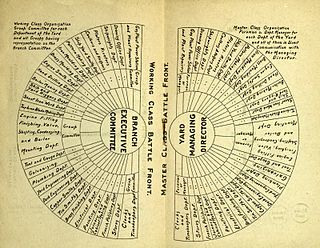 W
WIndustrial unionism is a trade union organizing method through which all workers in the same industry are organized into the same union—regardless of skill or trade—thus giving workers in one industry, or in all industries, more leverage in bargaining and in strike situations.
 W
WThe Industrial Workers of the World (IWW), members of which are commonly termed "Wobblies", is an international labor union that was founded in 1905 in Chicago, Illinois, in the United States. The origin of the nickname "Wobblies" is uncertain. The union combines general unionism with industrial unionism, as it is a general union, subdivided between the various industries which employ its members. The philosophy and tactics of the IWW are described as "revolutionary industrial unionism", with ties to socialist, syndicalist, and anarchist labor movements.
 W
WAn injury to one is an injury to all is a motto popularly used by the Industrial Workers of the World. In his autobiography, Bill Haywood credited David C. Coates with suggesting a labor slogan for the IWW: an injury to one is an injury to all. The slogan has since been used by a number of labor organizations. The slogan reflects the fact that the IWW is "One Big Union" and organizes skilled and unskilled workers. Despite the reduced number of organized workers today, the slogan is still popular with labor unions and other organizations. The core principles of NATO are also related to this.
 W
WInternational Workers' Day, also known as Labour Day in most countries and often referred to as May Day, is a celebration of labourers and the working classes that is promoted by the international labour movement and occurs every year on May Day.
 W
WThe Kuzbass Autonomous Industrial Colony was an experiment in workers' control in the Soviet Union from 1922 to 1926 during the New Economic Policy. It was based in Shcheglovsk, Kuzbass, Siberia.
 W
WThe Le Mouvement socialiste was a revolutionary syndicalist journal in France founded in 1899 by Hubert Lagardelle and dissolved in 1914. Other key founders included Karl Marx's grandson Jean Longuet and Émile Durkheim's nephew Marcel Mauss. It advocated segregation of social classes; opposed bourgeois life, democracy, universal suffrage, and parliamentarism; and supported a society led by "conscious, rebellious" men that would develop a disciplined bold new man as part of a "worker's army". The journal was popular and attracted an international audience in its examination of Marxism and revolutionary syndicalism, with well-known revolutionary syndicalists contributing to it, such as Georges Sorel and Victor Griffuelhes.
 W
WThe Musée de l'Histoire vivante is an historical museum located in Montreuil-sous-bois, adjacent to the eastern part of Paris, France.
 W
WIn organization theory, mutual aid is a voluntary reciprocal exchange of resources and services for mutual benefit. Mutual aid projects are a form of political participation in which people take responsibility for caring for one another and changing political conditions.
 W
WThe National Labor Secretariat was a trade union federation in the Netherlands from 1893 to 1940.
 W
WNew Harmony initially Motherland is a left-wing populist party in Latvia, founded in 2004. Its chairman was Viktors Kalnbērzs and its membership included currency exchange businessman Juris Žuravļovs. The founding parties were the Social Democratic Welfare Party led by Žuravļovs, "For Freedom, Social Justice and Equal Rights" and the Latvian Youth Party of Jānis Kuzins. From 2005 Motherland was represented on the Riga City Council, being elected in a coalition with the Socialist Party of Latvia. In the 2006 parliamentary election Motherland got 2.08% and failed to gain representation in the Saeima. The coalition was dissolved in 2008.
 W
WThe One Big Union (OBU) was a Canadian syndicalist trade union active primarily in the western part of the country. It was initiated formally in Calgary on June 4, 1919 but lost most of its members by 1922. It finally merged into the Canadian Labour Congress during 1956.
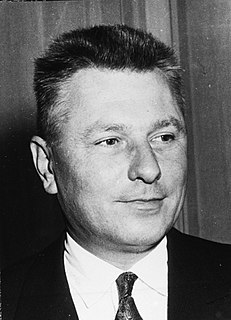 W
WRenardism refers to a political ideology in Belgium based on the thinking of the trade union leader André Renard (1911–62). Popular in parts of Wallonia, Renardism combined elements of syndicalism and regionalist politics. It ultimately sought the transformation of Belgium into a federal state.
 W
WWithin the Marxist movement, revisionism represents various ideas, principles and theories that are based on a significant revision of fundamental Marxist premises that usually involve making an alliance with the bourgeois class.
 W
WSocialist self-management or Self-governing socialism was a form of workers' self-management used as a social and economic model formulated by the Communist Party of Yugoslavia. It was instituted by law in 1950 and lasted in the Socialist Federal Republic of Yugoslavia until 1990, just prior to its breakup in 1992.
 W
WThe Socialist Party, also called the "Kolthek party" after its founder Harm Kolthek, was a Dutch revolutionary syndicalist political party. It was represented in Parliament between 1918 and 1922.
 W
WSolidaridad Obrera was a labor federation in Catalonia, Spain. It was initially formed on August 3, 1907, as a "pure syndicalist" federation, incorporating the structures of the Unió Local de Societats Obreres de Barcelona with the purpose of reorganizing the Catalan trade unions. These unions were quite weak at the time, due to the failure of a 1902 general strike which had sought the eight-hour day and the recognition of the right to strike.
 W
WThe Solidarity Federation, also known by the abbreviation SolFed, is a federation of class struggle anarchists active in Britain. The organisation advocates a strategy of anarcho-syndicalism as a method of abolishing capitalism and the state, and describes itself as a "revolutionary union". In 1994 it adopted its current name, having previously been the Direct Action Movement since 1979, and before that the Syndicalist Workers' Federation since 1950.
 W
WNaissaar is an island northwest of Tallinn in Estonia. The island covers an area of 18.6 square kilometres. It is 8 kilometres long and 3.5 kilometres wide, and lies about 8.5 kilometres from the mainland. The highest point on the island is Kunilamägi, which is 27 metres above sea level. The island consists predominantly of coniferous forest and piles of stones and boulders. In 2005, the island had a population of ten; in 2011 the island had 35 or so permanent residents and some summer residents. Administratively the island is divided into three villages: Lõunaküla (Storbyn), Tagaküla (Bakbyn), and Väikeheinamaa (Lillängin).
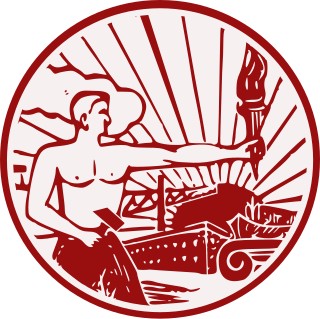 W
WThe Syndicalist Party was a left-wing political party in Spain, formed by Ángel Pestaña in 1932. Pestaña, a leading member of the Confederación Nacional del Trabajo (CNT) trade union, formed the party in response to the growing influence of the Iberian Anarchist Federation over the CNT. He and other notable members of the CNT had previously signed a Manifest dels Trenta, which had got them expelled.
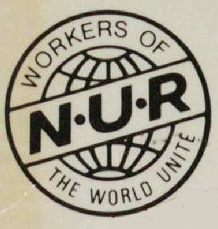 W
WThe National Union of Railwaymen was a trade union of railway workers in the United Kingdom. The largest railway workers' union in the country, it was influential in the national trade union movement.
 W
WMario Tronti is an Italian philosopher and politician, considered as one of the founders of the theory of operaismo in the 1960s.
 W
WThe Union of Russian Workers in the United States and Canada, commonly known as the "Union of Russian Workers" was an anarchist political association of Russian emigrants in the United States. The group was established shortly after the failure of the Russian Revolution of 1905 and was essentially annihilated in America by the 1919 Red Scare in which it was targeted by the Bureau of Investigation of the U.S. Department of Justice. Thousands of the group's adherents were arrested and hundreds deported in 1919 and 1920; still more voluntarily returned to Soviet Russia. During its brief existence the organization, which was only loosely affiliated with the Industrial Workers of the World, published numerous books and pamphlets in Russian by anarchist writers, operated reading rooms and conducted courses to teach newly arrived Russians English, and fulfilled a social function for emigrants half a world from home.
 W
WUnione Sindacale Italiana is an anarcho-syndicalist trade union. It is the Italian section of the International Workers' Association, and the name of USI is also abbreviated as USI-AIT.